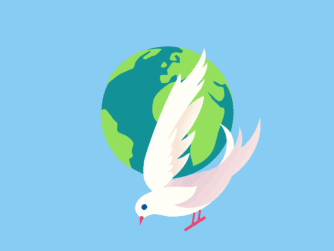Voice 1
Welcome to Spotlight. I’m Colin Lowther.
Voice 2
And I’m Liz Waid. Spotlight uses a special English method of broadcasting. It is easier for people to understand, no matter where in the world they live.
Click here to follow along with this program on YouTube.
Voice 1
On August 6, 1945 the United States dropped an atomic bomb on the city of Hiroshima, Japan. The bomb killed 80,000 people in just a few seconds. Three days later, the U.S. dropped another atomic bomb on the Japanese city of Nagasaki. More people were killed and the city was destroyed. But these bombs also released radiation. Radiation is poisonous to humans. In the weeks that followed, many thousands of people died.
Voice 2
This was the only time in human history when atomic weapons were used in war. The result was terrible. This event changed human history. It changed how people thought about radiation and atomic weapons. But it did not stop countries from making more atomic bombs. And some countries continue to make even more powerful bombs. Today’s Spotlight is on why some countries have atomic bombs, why other countries do not, and why these bombs exist.
Voice 1
Atomic bombs are one kind of nuclear bomb. The other is called a hydrogen bomb. Both are very powerful and very deadly. The science of making a nuclear bomb is very complex. The technology costs a lot of money. Countries that have them keep secret the method of making a bomb. Even working with the material to make the bombs can be very, very dangerous.
Voice 2
Scientists have been learning about nuclear energy since the early 1900s. People were excited about the power that nuclear energy provides. But when people learned about nuclear bombs, these weapons spread quickly. One reason for this was the political situation at the time. It was during the Cold War, from the end of World War II until about 1991. During this period, much of the world was afraid that war could happen again at any time. So the major powers in the world collected weapons, including nuclear bombs.
Voice 1
There are only nine countries that have nuclear weapons. They are: Russia, the United States, China, India, Israel, France, North Korea, Pakistan, and the United Kingdom. Most of these countries have between 80 and 300 bombs. But two countries have many more. Russia and the United States have over 5,000 bombs each. These bombs have enough power to destroy the whole planet.
Voice 2
Other countries are trying to get nuclear weapons. In recent years both Iran and Syria have tried to develop nuclear weapons. But countries are not permitted to develop nuclear weapons whenever they want. This is because of the Treaty on the Non-Proliferation of Nuclear Weapons. This treat bans countries form proliferating, or making and spreading, nucelar bombs. The counties of the United Nations agreed on this treaty in 1970. It states that nuclear power technology is for any country. But no new countries can develop nuclear weapons. And those countries that have nuclear weapons will try and destroy the weapons they have.
Voice 1
This is why the United Nations tried to stop Iran from creating a nuclear bomb in 2005. To do this, they used sanctions. Sanctions can include locking bank accounts, stopping trade, and requiring inspections – where people and places are examined to make sure they are following the rules.
Voice 2
Is this fair? Is it fair for countries with nuclear bombs to tell other countries they cannot have them? After all, if a country has a nuclear bomb, they become more important in global politics.
Voice 1
For example, North Korea is not a large country. It does not have a strong economy. But North Korea has a nuclear bomb. Having a nuclear bomb makes North Korea a more powerful country. There are many things about the government of North Korea that other countries do not like. The United Nations has even placed sanctions against North Korea, but the United Nations is very slow to act because they know that North Korea has a nuclear weapon.
Voice 2
On one level, sanctions do not seem fair. The United States is the only country to ever use a nuclear weapon in war. So why should they decide who can be responsible? There are five members of the United Nations Security Council: China, France, Russia, the United Kingdom, and the United States. These countries have the most powerful armies in the world. But does that mean they can tell other countries what to do?
Voice 1
ICAN is the International Campaign to Abolish Nuclear Weapons. This organization believes that even one nuclear weapon is too many. The ICAN website states that,
Voice 3
“A single nuclear weapon could kill millions of people. These effects last for many years. The failure of the nuclear powers to get rid of their weapons has raised the risk that other countries will get nuclear weapons. The only way to stop the spread and use of nuclear weapons is to destry them immediately. Although the leaders of some nations have expressed their desire for a nuclear-wepon-free world, they have failed to develop any plans to reduce their weaons. In fact, they are improving them.”
Voice 2
Destroying nuclear weapons is not easy. It is just as dangerous to break a bomb into pieces as it is to build it. Nuclear bombs contain explosive materials, nuclear materials, as well as electronics and the bomb case. People could steal or lose the dangerous bomb materials. And even when a bomb is destroyed completely the poisonous radioactive material still needs to be stored. It will continue to be dangerous for hundreds or years.
Voice 1
Destroying nuclear weapons is difficult. It costs a lot of money. And it takes a long time. But ICAN says that does not mean countries should not try. ICAN argues that,
Voice 3
“Nuclear weapons threaten the environment and humans. They release huge amounts of energy in the form of force, heat and radiation. No good humanitarian response is possible. A bomb would cause tens of millions of immediate deaths. A nuclear war could change the global climate and food production so much that more than a billion people woule be at risk of starving.
Voice 2
Do you worry about nuclear weapons? Do you think it is fair that some countries have them and other countries do not? Do you think we should get rid of all nuclear weapons? Tell us what you think. You can leave a comment on our website. Or email us at radio@radioenglish.net. You can also comment on Facebook at Facebook.com/spotlightradio.
Voice 2
Have you ever read any Sherlock Holmes stories? What is your favorite? You can leave a comment on our website. Or email us at contact AT spotlightenglish DOT com. You can also find us on YouTube, Facebook, Instagram, and Twitter.
Voice 1
The writer of this program was Adam Navis. The producer was Michio Ozaki. The voices you heard were from the United Kingdom and the United States. All quotes were adapted for this program and voiced by Spotlight. You can listen to this program again, and read it, on the internet at www.radioenglish.net. This program is called, ‘The World and Nuclear Weapons’.
Voice 2
Look for our listening app in the Google Play Store and in iTunes. We hope you can join us again for the next Spotlight program. Goodbye.
Question:
Do you worry about nuclear weapons? Do you think it is fair that some countries have them and other countries do not? Do you think we should get rid of all nuclear weapons?








Science, which is knowledge, is always good. Technology, which is the use of science, can be good if it serves to build things useful to man and nature, it is bad if it builds devices to destroy the work of man and nature. Nuclear bombs should never have been built, but they are there and I don’t think it’s possible to destroy them, and perhaps it wouldn’t even be worthwhile, if they allow us to avoid a third world war. If there was a third world war, the fourth, as Einstein said, would be fought with sticks and stones. We have to trust the intelligence of man.
Wow
The audio don’t hear
The audio don’t hear
The audio don’t hear
The audio don’t hear
I do not worry about nuclear weapons becuse my country Ecuador is not involved in that things.
I think it is not fair for other countries to have nuclear weapons and other countries not to have them because they have a lot of advantage at weapons in a war.
I think we should get rid of that nuclear weapons because if one country does not have nuclear weapon that means no one should have them.